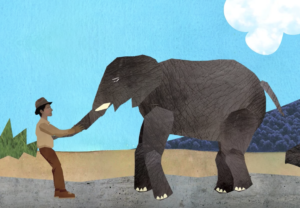 What can an elephant teach us about the art of persuasion? Plenty.
What can an elephant teach us about the art of persuasion? Plenty.
Emotion is the six-ton beast stomping all over our desire for logical, rational thought. And that’s why stories are such an effective tool for influencing and persuading others.
What’s Emotion Got to Do With It?
We are not creatures of reason. Deep down, we make decisions based on emotion. Abundant research points to the role emotion plays in driving decision-making — sometimes to our detriment.
Neuroscientist Antonio Damasio looked at cases where people had sustained damage to the area of their brain that governs emotion and found that they were rendered incapable of making the simplest decisions. Without emotion, they were paralyzed.
So emotion doesn’t just drive decision-making, it actually unlocks it. If you want to make a person do something, you need to make him feel something.
The Elephant, The Rider and the Path
The role of emotion is elegantly explained in this short video I just came across:
Emotion is essentially a big immovable object that no amount of logic can overcome on its own. Emotion is what motivates us to act.
The Practical Applications of Emotion
The implications for our everyday lives are many:
- A hiring manager will look at the qualifications and experience of the various applicants but will ultimately be driven by feelings such as, I like this person, we get along, she would fit in well here.
- A buyer will listen to a variety of sales pitches and weigh the pros and cons of each provider but will ultimately be moved by feelings of trust (I believe this guy, I trust him), among other emotions like security or status.
- A skeptical employee may give a new manager the benefit of the doubt if he feels some affinity — they share a similar interest, have kids the same age or are both passionate about the business (Here’s common ground).
How to provoke that emotion? Through story.
Use Stories to Tap into Emotion
Stories are the perfect emotion delivery vehicle. It’s why we’re left drying our tears at the movies as the house lights come up or hold our loved ones a little closer when watching a tragic tale play out on the news.
Stories pack their punch because of the emotional component. That means:
- If you’re that job applicant, you should tell a story that reveals your true self, your passions and interests.
- If you’re selling, you should tell a story about what really drives you (beyond profits) — how are your products or services making a difference in ways large and small, and what does that mean to you?
- And if you’re that newcomer, you should share a personal story that gives people a glimpse of who you are and what you stand for.
Stories — especially stories with a strong emotional core — help break down walls, build trust, establish and deepen relationships and, ultimately, influence people to act in the way we’d like them to act.
That’s something that no amount of fact sheets, white papers, resumes and reports can accomplish — at least on their own.




